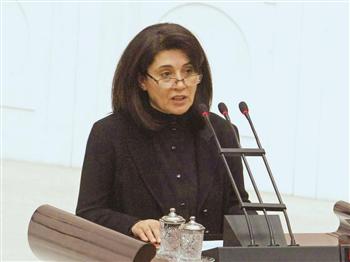Turkey Analysis: An Opposition MP Gives Prime Minister Erdogan An Edge on the Kurdish Issue
 Last week, Leyla Zana, an MP of the pro-Kurdish opposition Peace and Democracy Party, expressed hope in an interview that Prime Minister Recep Tayyip Erdogan would solve the Kurdish issue:
Last week, Leyla Zana, an MP of the pro-Kurdish opposition Peace and Democracy Party, expressed hope in an interview that Prime Minister Recep Tayyip Erdogan would solve the Kurdish issue:
There is a solid fact here. Let’s say this openly and accept this fact. If he wanted, the strongest can solve this [Kurdish] issue. Who is the strongest one? It’s the government and its head, Recep Tayyip Erdogan. The person who is the head of the strongest government in [our] history is able to show the willpower and has the power to sort out this issue. I believe that he will be able to solve this issue. I have never lost my faith in him solving this issue. And I don’t want to lose my faith in him. If I had lost [my faith], I wouldn’t be here.
Zana's party co-chairman Selahatting Demirtas called her a "naive person" in keeping faith in the Prime Minister. Demirtas added:
Erdogan’s statements are all clear. Which of his policies can boost our hopes? The hope for solution is not in Erdogan, but in the people.
The BDP's demands from the government are clear: An immediate halt to military and political operations, such as the investigation of the Kurdish umbrella group KCK, a lifting of the isolation of Kurdish leader Abdullah Ocalan, establishment of a Parliamentary peace commission, and abolition of anti-terror codes along with the special authorities of courts.
Zana responded to the criticisms in another interview:
We should cling to it, even if there is little hope. We should seek ways to increase this hope. Our young people are dying every day. We will have lost thousands of children as we seek ways for a solution 10 years down the line. Politics is the art of keeping hope alive. Everyone should shoulder some responsibly. I did.
The Government's reaction was far from dismissive Deputy Prime Minister Bulent Arınc said that the issue of house arrest for Ocalan was on the table. This was adjusted by another Deputy Prime Minister, Besir Atalay, who underlined that this issue could be raised only when the Kurdish insurgency PKK laid down arms with no conditions. Erdogan said that he would talk to Zana if she desired.
So, how does one interpret the latest moves? According to sources close to the BDP, offiicals of the Iraqi Kurdistan Regional Government and the PKK have met 16 times over the last nine months; four of those meetings included the Kurdish Regional Government's leader Masoud Barzani.
The Turkish Government has asked Barzani to press the PKK to lay down arms. Of course, Barzani never explicitly demanded this; instead, he reiterated that both sides should give up violence and sit down at the negotiating table.
The PKK still refused this, while the BDP's domestic and international position was disturbed effectively by US support for Barzani's role. The BDP co-chairman Demirtas declared over and over that it was not Barzani but Ocalan and Turkey's Kurds who have the final say in the process, but Washington slapped down the BDP, as Secretary of State Hillary Clinton refused to meet a BDP envoy in Washington. Not only was the US showing Ankara's increasing importance as an ally; it was also pointing to the PKK's strategic mistake in remaining close to Iran and maintaining silence over events in Syria.
So Zana's move is a Barzani-backed strategy to shake the BDP. It has shown preliminary results, with NGOs accepting the Government's declaration of Kurdish language as a selective course in secondary schools as a significant reform. There should be no expectation, however, that it will lead the PKK to lay down its arms. At most, the Kurdish insurgency will declare a temporary and unilateral ceasefire when the discussions over the new Constitution heat up.
Meanwhile, the leading Turkish daily Hurriyet is claiming that Free Syrian Army representatives has asked the PKK to give up its support for the Assad regime. Such a move would be risky: breaking relations with Tehran and Damascus would could leave the Kurdish insurgency isolated on the frontline. However, the PKK may also need to re-balance its relations both with Barzani and with Washington.
And Prime Minister Erdogan enjoys his political advantage. If Zana's remarks can find broader support both from the Turkish opposition and the Kurdish community, he may be closer to "solving the Kurdish problems" and doing so in his way on his terms.
 BDP,
BDP,  Bulent Arinc,
Bulent Arinc,  Free Syrian Army,
Free Syrian Army,  Hillary Clinton,
Hillary Clinton,  Iran,
Iran,  Leyla Zana,
Leyla Zana,  PKK,
PKK,  Selahattin Demirtas,
Selahattin Demirtas,  Syria,
Syria,  Turkey,
Turkey,  undefined
undefined 
Reader Comments